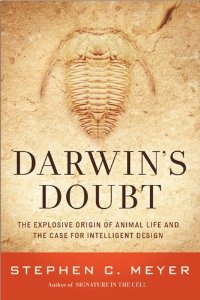 Evolution
Evolution
 Intelligent Design
Intelligent Design
#3 of Our Top-Ten Evolution Stories of 2013: Darwin’s Doubt Debuts at #7 on New York Times Hardcover Nonfiction Bestseller List

Editor’s note: The staff of Evolution News & Views wish you a happy New Year! We’re on a light reporting schedule as we enjoy some vacation time with family and friends. In the meantime we offer to our wonderful readers a countdown of the past year’s Top 10 stories reflecting the most exciting and important developments in the evolution debate, concluding on New Year’s Day. It should probably not come as a major surprise that our top three stories of the year focus on Stephen Meyer’s important book: the responses, respectively, from the public, from serious scientists, and from serious and respectful critics. Enjoy!
Oh, and by the way, if you haven’t finalized your year-end contribution to support the work of the Center for Science & Culture, including ENV, please do so now. We appreciate your generosity!

Published originally on July 1, 2013.
Judging the success of an idea in reaching and convincing a large audience is a tricky business. In putting your case to the public in books and articles, are you making progress, just holding steady, or losing ground to competitors? What you want is a solid, unambiguous metric. Hmm, as a measure of success in getting a particular argument before a large chunk of the thoughtful, book-reading public, how does a spot on the New York Times bestseller list sound?
That would do nicely. And in fact it is just what we are very pleased to report. As careful readers will already have discerned from the headline, Stephen Meyer’s new book, Darwin’s Doubt: The Explosive Origin of Animal Life and the Case for Intelligent Design, debuted on Sunday, July 7, in the #7 place on the New York Times hardback nonfiction list. See it here.
The Times even has a remarkably accurate summary of what’s in the book — something to which we’re not entirely accustomed when dealing with the media:
DARWIN’S DOUBT, by Stephen C. Meyer. (HarperOne.) The theory of intelligent design best explains the appearance of animals in the fossil record without apparent ancestors.
That is referring to the geologically sudden eruption of complex animal life in the Cambrian explosion, about 530 million years ago, a thread that Meyer pulls in the first third of the book and that results in the conclusive unraveling of Darwinian theory in the final two-thirds.
The book also opened at #10 on the Publishers Weekly bestseller list.
 Congratulations to our friend and colleague Stephen Meyer!
Congratulations to our friend and colleague Stephen Meyer!
We attribute these indications of really impressive progress to the scientific, philosophical and yes, cultural and even spiritual importance of Dr. Meyer’s book, the unprecedented rigor and scope of his argument, combined with a lucidly accessible style that bestselling novelist Dean Koontz has praised, saying that Meyer “writes beautifully” and “marshals complex information as well as any writer I’ve read.”
It doesn’t hurt either that this broadly interdisciplinary book has won accolades from scientists representing a variety of relevant fields, including Harvard geneticist George Church, Mt. Holyoke paleontologist Mark McMenamin, State University of New York biologist Scott Turner, Max Planck Institute for Plant Breeding Research biologist Wolf-Ekkehard Lönnig, and others, scientists whose own works are published by sources like Harvard University Press and Columbia University Press.
Excitement from the media has also played a role in getting out the word. Dr. Meyer has been on the Michael Medved Show several times, on the Dennis Prager Show, the Dennis Miller Show, and many other national and local talk-radio programs. Not trivial either is the decision by Barnes & Noble to feature the book with in-store displays in 300 of its bookstores across the country, likely due in part to the strong sales record of Meyer’s first book, Signature in the Cell.
It has been the strategy of the most rigid, orthodox Darwinian advocates either to deny that there is any controversy about evolutionary theory or, failing that, to try to assure the public that thoughtful people can safely, responsibly ignore the argument for intelligent design as a mere reformulation of Biblical creationism. Darwinists have sought to avoid a fair fight on the merits by misrepresenting and stigmatizing the competing theory.
The publication of Meyer’s book marks the moment when the theory of intelligent design — love it or hate it — has solidly joined the mainstream discussion about biological origins. We of course can’t say how the debate will ultimately be resolved. No one can. But we take great satisfaction in knowing that it is definitively engaged. The hunt for a replacement theory for Darwin’s noble but crippled idea is now unmistakably on — not only in the professional, peer-reviewed scientific literature, as Stephen Meyer documents, but in the public square as well.
